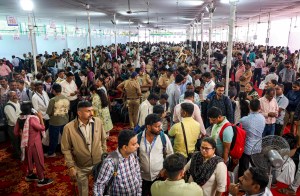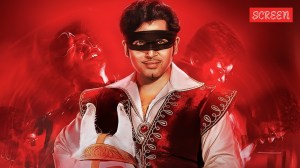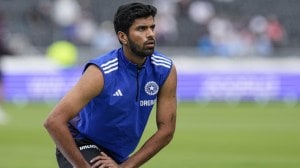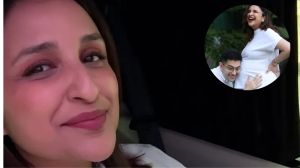Disney8217;s monkey playing chess
Karl Marx and Walt Disney. A fairly good mismatch. Marxists and Walt Disney. A perfect crosshatch. Nevertheless, rhyme apart, we detect a Ma...

Karl Marx and Walt Disney. A fairly good mismatch. Marxists and Walt Disney. A perfect crosshatch. Nevertheless, rhyme apart, we detect a Marx-Disney confluence of sort, somewhere along the line, as we look back.
In a caustic passage on certain people, notably not the proletariat, Marx described them as the quot;on the one handquot; and quot;on the other handquot; lot. And a Disney cartoon strip features a monkey playing a solitary game of chess, moving one set of coins with his hand and the other with his tail. Now, recall the posture of the CPIM shilly-shallying over the question quot;To team up or not to team up with the Congress Party?quot; Mock deja vu?
A senior journalist told me that he felt rather happy about the post-poll confusion. It spoke for the need to get out of all ideological ruts and get oneself poised for impromptu words, impromptu gestures, impromptu decisions, yes, a moment-to-moment politics. But then I listened to a CPIM leader who, facing a post-poll TV channel fusillade, declared his party8217;s finalrepeat final decision to keep away from the Congress party. The way he said it you got the feeling that it was the party8217;s decision all along. It was reminiscent of the Amitabh Bachchan mannerism of elaborately locking the lips after the delivery of every line, which gives you the feeling that he has run out of dialogue. But the dialogue was not over. It was to continue, a sequence of deliveries defying its own time-scale. Look at the following post-poll series of chess movements.
White to move: quot;The Congress party is real bad. If we act as their entourage, people are gonna ask us: For heaven8217;s sake, why did you do such a thing!quot;
Black to move: quot;You know what the BJP has done to the country with only a single state under their control. Imagine giving away the whole country to those fanatics. This is why we need to consider possibilities of striking a deal with the Congress party.quot;
No imaginary script, this one. I was just paraphrasing an authentic statement from a CPIM hardliner, made in onesitting. It needs enormous tactical knowhow to convert a king-size snafu into a double entry system that would account for any future action. But it didn8217;t seem to have given them a cutting edge, in spite of the impetus they could have given at will to a Congress-led government. This amounted to a defeat that vertically cut across two levels.
At the top level, their quot;on the one handquot; and quot;on the other handquot; stance is to be contrasted with that of the party8217;s Central Committee which, following the 1996 election, walked like billy-ho into the great-politik Hall of Fame, by turning down flat an opportunity for Jyothi Basu to become the Prime Minister. Even Basu8217;s later confession, that it was a historical blunder, came as a neat counterpoint. But then came the counter-counterpoint, Surjeet8217;s compulsive giraffe-necking into an easy, greedy Yes.
At the bottom level, the presence of the front with its electoral bronze was hardly felt as the decisive factor that could tilt the scale. The buzzwords were to beJayalalitha and Chandrababu Naidu. Prannoy Roy called the former quot;the queen of the electionquot; and the latter could be easily dubbed quot;the king of the electionquot;, considering how desperately his political leverage was sought by the needy How his quot;equidistancequot; policy was outdistanced is a different story.
Yes, a bilevel setback, but Disney8217;s monkey plays a fool-proof chess: Hand wins I win, tail wins I win!8230;
How could one explain this? Perhaps the left front was cocksure of capturing more seats, which would mean no kowtowing to any Congress diktat, but the idea didn8217;t pan out. This explains their open-ended pre-poll attitude and the post-poll dilemma. A cloudy picture altogether, but it has a silver lining. Which is that a party, famous for its conditioned reflexes and slaphappy finality, proved itself to be capable of oscillation, fear of taking hasty decisions and occasional kite-flying8230; In short, all the typical signs of ordinary mortals grappling with a new situation.
- 01
- 02
- 03
- 04
- 05































